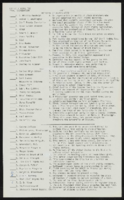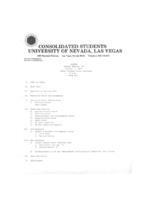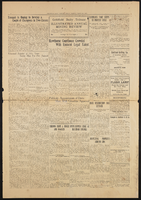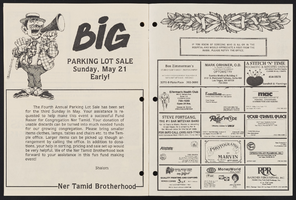Search the Special Collections and Archives Portal
Search Results
Alice P. Broudy Papers on Broudy v. United States
Identifier
Abstract
The Alice P. Broudy Papers on Broudy v United States (1940-2018) comprise materials collected and created by the wife of Charles A. Broudy during her effort to obtain compensation for his death in 1977, which she believed to be a result of repeated radiation exposure. Materials include government documents obtained through the Freedom of Information Act (FOIA), correspondence, memos, litigation papers, scholarly reports and articles on radiation exposure and its effects, congressional testimony, speeches, newspaper clippings, books and audiovisual materials. Also included are photographs, slides, and one box of Alice "Pat" Broudy's personal papers. There are two boxes of papers that remain unprocessed.
Archival Collection
Ham Family Photograph Collection
Identifier
Abstract
The Ham Family Photograph Collection contains five photographic albums primarily featuring images of the Ham family's travels throughout the western United States and Artemus W. Ham Jr. and Betty Ham Dokter during their childhood between approximately 1900-1949. Also included is one photograph used as a Christmas greeting for the Ham family from 1981. The photographs feature locations including Cedar Breaks National Monument, Utah; Grand Canyon, Arizona; and Yosemite National Park, California. The collection also contains photographs of the Ham family at Mormon sites throughout Utah. Lastly, there are postcards and photographs of locations throughout the United States, Germany, and Japan.
Archival Collection

Micheal Miller interview, April 5, 1976: transcript
Date
Archival Collection
Description
On April 5, 1976, collector Broderick T. Ackerman interviewed Michael Miller who has lived in Nevada since 1910. In this interview, Mister Miller speaks about his time working on ranches and as a trapper in Northern Nevada. He also speaks about his time running nightclubs in Las Vegas, Nevada, as well as seeing much growth throughout his time living in Las Vegas.
Text

Letter from R. L. Adamson (Los Angeles) to F. H. Knickerbocker, April 22, 1927
Date
Archival Collection
Description
Adamson recommended installing a meter to see how much water the water company was using so they could use the information for negotiatiing a contract renewal for providing water to Las Vegas. "36-47-L" written in pencil at the top. Date stamp from A.S.H.
Text

Meeting minutes for Consolidated Student Senate, University of Nevada, Las Vegas, February 19, 1980
Date
Archival Collection
Description
Text

UNLV Ethnic Studies 102 final exam (blank) and Ethnic Studies (ETS 480X) "Seminar in Race Awareness: Minority Groups and Media" assigned readings
Date
Archival Collection
Description
From the Roosevelt Fitzgerald Professional Papers (MS-01082) -- Personal and professional papers file.
Text
Las Vegas African American Community Conversations round table interviews
Identifier
Abstract
The Las Vegas African American Community Conversations is a four-part conversation with local Las Vegans. The first part of the round table is moderated by Trisha Geran with a central theme of "Migration, Work and Community Emergence." The panelists discuss the early history of the African American community in Las Vegas, Nevada. They also discuss how and why their families moved to Las Vegas, most citing the economic opportunities as a major factor. The participants share their personal histories and family histories building up the African American community in downtown Las Vegas and the Westside. The second part of the round table is moderated by Sonya Horsford with a central theme of "Education, Economy, and Integration." The panelists discuss the Clark County School District pre- and post-integration. They discuss the hardships of the Sixth Grade Center Integration Plan on the African American community as well as discussing the differences in the school facilities. The round table participants also discuss the social services and social programs and the history of those programs from the African American perspective. They also discuss civic involvement and the various civic groups started by the panelists, and share discrimination they faced.
The third part of the round table is moderated by Claytee D. White with a central theme of "Civil Rights and Entertainment." The panelists discuss the racism and segregation present in Las Vegas and discuss how African American community leaders worked to integrate African Americans into the Las Vegas community. They discuss the 1969 riots in detail, and discuss African American entertainers and the entertainment industry. They share personal experiences working in the entertainment industry and discuss the importance of the local unions, such as the Culinary Workers Union Local 226, the International Alliance of Theatrical Stage Employees Local 720, and their contributions to the unions. The fourth and final part of the round table is moderated by Rachel Anderson with a central theme of the "Early African American Legal Community." The panelists discuss the foundations of the professional legal community in Las Vegas, noting the contributions of Charles Keller, Dr. William Bailey, and the Reverend Marion Bennett as driving forces for civil rights activism in Las Vegas. They share their experiences growing up in Las Vegas facing discrimination and segregation. Lastly, they share the changes they have seen and how both the legal and African African communities have grown.
Archival Collection

Meeting minutes for Consolidated Student Senate, University of Nevada, Las Vegas, October 07, 1980
Date
Archival Collection
Description
Text


